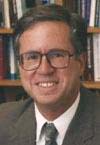The Theology of ProvidenceHow might we relate current scientific theory to the theology
of continuous creation and special providence, in which God is
seen as acting in all the events of the world, in both nature
and human history. Can that be reconciled with a scientific account
of the universe without having to think that God must break the
laws of nature which God creates and upholds in order to bring
something genuinely new and decisive about? The notion of God’s acting in the world is central to
the biblical witness. From the call of Abraham and the Exodus
from Egypt to the birth, ministry, death and raising of Jesus
and the founding of the church at Pentecost, God is represented
as making new things happen. The rise of modern science in the seventeenth century and Enlightenment philosophy in the eighteenth, however, led many to reject the traditional view of providence. Newtonian mechanics depicted a causally closed universe with little, if any, room for God’s special action in specific events - and then only by intervention. A century later, Pierre Simon Laplace combined the determinism of Newton’s equations with epistemological and metaphysical reductionism to portray all of nature as an impersonal mechanism. David Hume challenged the arguments for God as first cause and as designer. In response, Immanuel Kant constructed a new metaphysical system in which religion lies not in our knowing (the activity of pure reason) but in our sense of moral obligation (the activity of practical reason). The effect was to separate the domains of science and religion into "two worlds", and this position is still with us in the twentieth century as we’ve already seen. Protestant theology in the first half of the twentieth century was largely shaped by Karl Barth who attempted to circumvent the Kantian split by holding fast to the objective action of God in creating and redeeming the world. The `God who acts’ continued as a hallmark of the ensuing "biblical theology" movement in the 1940s and 1950s. But to many theologians today, Barthian neo-orthodoxy and the biblical theology movement did not finally succeed in overcoming the "two worlds" problem or in producing a credible account of divine action. Contemporary Roman Catholic thought, still largely tied to a Thomistic metaphysics, has encountered different but equally challenging problems in dealing with objective special providence. And so we find ourselves at the heart of the problem. Given the scientific account of a closed, mechanical universe, and the reductionistic philosophy which often accompanies it, it seems as though there are but two options: either God must intervene in order to act objectively in special events by breaking or suspending the laws of nature, the "conservative" approach, or else God only acts uniformly in all events to sustain them in existence, the "liberal" approach. Is any other option possible? Email link | Printer-friendly | Feedback | Contributed by: Dr. Robert Russell |







